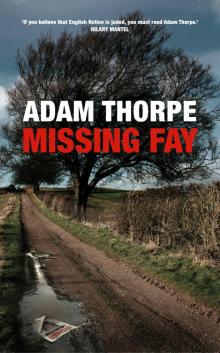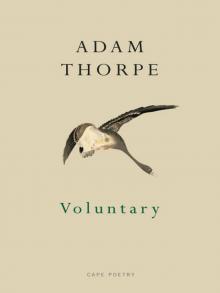- Home
- Adam Thorpe
The Standing Pool Page 7
The Standing Pool Read online
Page 7
‘Why did you try to catch me?’ Tammy demanded, nursing her wrist, which Sarah’s Duplo-split nail had scratched. The whole point was to let them go and let them fall.
She snatched a few moments on her own after hanging out the washing. It was a perfectly clear day. The light was almost severe and certainly pure. Nunnish, she thought. Sacred’s better. An infinite blue hazed into haloes of a green-tinged white along the gauze rumple of the hilltops. The sun was warm – almost burning – on the back of her neck. It was delightful. The whole thing was delightful. She felt as if she were being carried tenderly by the sacredness, her entire body uncoiling in the day’s arms as she knelt by the pool: the contentment of sunlight, the silence, the hints of earthiness in the clear air and the shifting shapes in the pool water. The smooth, warmish tiles under her hands. It was all so simple, really: happiness.
After tea, the girls went outside and played at the front, with an order not to go round to the back on their own.
Their parents were listening in the kitchen to France Inter on the old Sixties radio with dicky dials. This was intended to be a teatime routine, to loosen up their hidebound French. Now and again it was France Musique or even France Culture. It took some getting used to, after a unique diet of Radios 3 and 4. It was like visiting a trendy, younger aunt with a smoky voice after the comfortable, older one called Beeb who gave you your favourite biscuits and poured unsurpassable tea from under a knitted cosy, wittering on about her cats one minute and Kierkegaard the next. Blasts of rock or jazz interrupted the trendy aunt’s earnest discussions: she lived in Paris. The more intellectual she got, the more they understood. Nick and Sarah had great fun with this simile.
Today she was discussing Tadeusz Kantor. Whenever she grew particularly Left Bank, whirling her outrageous beads, they looked at each other and sniggered. The air was thick with the smoke of imaginary Gauloises. Words ended on a sigh.
Meanwhile, outside, Alicia was chasing Tammy around on the rough, gravelly area in front of the house. She was slowed down by her shorter legs and by Boris the inflatable hammer, although Tammy tantalised her by adjusting her speed or stopping altogether for a few seconds. Beans was stacking pebbles near the big pine tree with fierce concentration.
Tammy had stopped by one of the windows – catching her breath while Alicia was momentarily distracted by a sharp gust of wind that had hauled the inflatable from her grip. A noise grew in the corner of Tammy’s eye and for a fraction of a second concealed the view and her sisters in a dark flash. She was too surprised to cry out, let alone move.
An explosion, like the giant snapping of a jaw.
The huge black vehicle, as it disappeared up the track, reminded her of Sophie Cartwright’s four-by-four, always nearly squashing them in the playground as it delivered its golden gobbet on fat legs, and which had now been banned, like the taking of photos, from the school grounds. Beans had vanished. Tammy saw the green shoe, small and rubbery, but not the owner. She assumed she was run over, and frowned.
She had not caught up with the moment; she was still in a dream of it.
Then she saw Beans emerge from behind the big pine tree. She was sucking her thumb in fright: she had not been killed. She’d run away at the first sound of the vehicle, her shoe falling off. Tammy could hear the beast crashing away up the track as it climbed the slope behind.
Alicia stared down at the torn remnants of her inflatable. The wheel had gone right over it and it had burst. Hammer Boris was no more. He lay in surprisingly tiny fragments, shrivelled and torn.
‘Mend him, Mummy,’ she ordered, tearfully, after an account had been given to their mother in the kitchen: a din of overlapping narrative chords obliterating the earnest voices on the radio.
‘There are certain things you can’t ever mend,’ said Sarah, with an air of significance. She felt more disappointed than shocked, partly because the girls tended to embellish. ‘Are you sure it was going that fast? I can’t believe anyone would go that fast with kids around.’
‘Completely crazy,’ said Nick, who had been enjoying the Kantor discussion, having known nothing about him.
‘Stupid Jean-Luc,’ said Alicia.
‘It wasn’t him driving, was it?’
‘Of course it wasn’t,’ Tammy said, the possibility having never occurred to her. ‘It was a manic. Jean-Luc’s not a manic.’
‘A maniac. And it nearly ran you over?’ she asked, with an ironic, unbelieving air.
‘Beans was almost raspberry fool,’ Tammy confirmed, breathlessly. ‘Me too. Alicia wasn’t, she was miles away. Just as well or she’d have made a real fat mess.’
Alicia glowered at her. ‘I was nearly gnashed all up to bits,’ she said, ‘more than you.’
‘We’ll have to complain,’ said Nick, turning the dial on a whiplash of static, reducing the child-free aunt to a mutter.
‘Who to?’ Sarah asked, rhetorically. ‘It’ll be just like at home with our feral youths.’
‘Spoilt yobs, you mean. That’s different.’
‘Feral youths’ was usually an expression other mothers used, not Sarah, which was why she’d given it an ironic colouring. It meant not being able to go to the local shops after dusk. It meant hurrying past the bus shelter and looking the other way. Sarah liked the word ‘feral’. Maybe because she suspected that a universal state of feralousness (was that a word?) lay just round the corner.
‘Stupid cars,’ said Alicia. ‘Why do we have to have stupid cars?’
‘A dose of the real world,’ Sarah sighed. ‘How really depressing.’
‘Course we have to have cars,’ Tammy groaned, shaking her head in despair.
‘Ah, but not necessarily,’ said Nick. Unexpectedly, like a bubble released from a lake-bed, a perfect globe of happiness popped in his chest as he looked at his girls. ‘The internal combustion engine was never historically determined, in fact. Not much is. The whole disaster, in this case, goes back to the moment James Watt tightened the last bolt on his steam condenser in a damp yard in Glasgow. Blame the Scots,’ he added, jovially, turning to the young and lovely woman he loved and was bound to for life by these three perfect ribbons.
But the girls had already wandered back to the sitting room, where they were noisily pretending to be squashed.
Three gooey splats on the sofa.
THREE
Jean-Luc Maille taps the nails into the doll with exquisite delicacy, using a glazier’s hammer. Tap. A navel. Tap tap. Another nipple.
The doll is tiny and legless and half-bald, a little bigger than his thumb. He found it in one of the Sandlers’ cellars last year when he was digging into the crusted layers of goat dung for garden fertiliser.
The doll lay in a spread of straw and ancient dust on what he guessed was a kind of oven: a great slab across two stone uprights next to the fireplace.
This cellar at Les Fosses has a fireplace in it, and two waist-high stone basins embedded in the walls, so worn that the bottoms, where the water ran out long ago, are wafer-thin. The floor, once he’d dug down to it, turned out to be cobbled, not tiled. He knows that makes it very old, maybe as old as the Romans. It hasn’t always been a cellar, obviously. It was once a house, carved out lower than ground level to keep an even temperature – warm in winter, cool in summer. It still keeps an even temperature. Maybe there was a whole village up there. Or at least a hamlet. All gone, now.
Jean-Luc lives with his widowed mother in the main street of Aubain, the commune’s principal village of some three hundred souls – two hundred in winter. Their house is slotted into a row that dates back to the Middle Ages, but which has suffered so many vicissitudes – burnings and floods and rebuildings – that their skew walls face the thin street with a kind of dun amorphousness, an ashen neutrality not helped by the odd, garishly painted set of shutters. Jean-Luc’s shutters are varnished the colour of chocolate: his late father’s taste. On the front door is the cardousso flower his father nailed there for good luck thirty years ago: dry as cigarett
e paper, it beams on the street like a very old and gap-toothed sun. Jean-Luc won’t touch it: it is the only defence against all the dark forces of bad luck.
Like the others, his house has one continuous staircase with a worn lino runner. It rises from the kitchen to two pinched rooms on each floor, without a corridor to join them. The door straight ahead in the kitchen opens to the little backyard and stepped garden – the households used to cultivate the hill’s terraces: onions, potatoes. The bathroom also lies off the kitchen, housed in a lean-to put together thirty years ago by Jean-Luc’s father, Elie Maille, out of breeze blocks roofed in transparent corrugated plastic, tinted a urinous yellow.
For almost all of his thirty-six years, Jean-Luc has had to pass through his mother’s room on the first floor to reach his own. Except for a year in the army when he was eighteen.
He’s had a dream for years: to clear one of the attics, insulate it with plasterboard, and knock out a window under the eaves. His mother thinks he’s mad. During the storm in October – the storm that drowned twenty-five people in their département and washed away hundreds of homes – the rain poured down the slope at the back and Jean-Luc had to open the yard door to let it through. The kitchen became a turbulent pool, emptying out into the street through the front door, where people were wading up to their knees. There was that much water it bunched up on the roof and moved uphill, seething under the cover tiles and finding every crack in the rafters, sheeting through onto the stuff stored in the attic, welling on his own ceiling and leaving brown tree-rings of damp. The house still stinks of damp. His dream will have to wait until they can scrape enough together to sort out the roof. The insurance won’t pay for that. And Jean-Luc hates heights. He can’t do it himself. He’ll just feel himself being dragged over the edge. He can hardly climb a ladder beyond a man’s height without it turning his head. Look at what happened to Raoul Lagrange, who wasn’t even scared of heights.
Aubain lost its school and its shop back in the 1990s, and its café hangs on by a thread. The bread van and the butcher’s van come round twice a week, hooting in front of the church. The farmer, Edouard, his vegetable stall a meeting point for the gossips every Saturday morning, has had a row with the mayor and no longer comes. The row was over the one euro the mairie wanted him to pay for parking his big van all Saturday morning: it was because he was a commercial enterprise, it was the law, it was not them being cussed. A matter of papers, forms, ticking boxes. Edouard left in a rage, one morning. He was never coming back, on principle. He was a sodding charity, putain: he was up before dawn on his land and got nothing for feeling knackered all day. The women drifted away, resigned. The mayor organised a weekly trip to the supermarket in Valdaron, using the mairie’s clapped-out minibus driven by Serge, under whose seat rolls a perpetual bottle of half-consumed local red.
The village is all but dead. This annoys Jean-Luc. He blames the foreigners, the second homers. He blames the Parisians. He blames all those who profit at the expense of others. But he keeps this rancour to himself. He has never been to Paris. He doesn’t see the point.
The legless doll has a hole each side of its groin where the hips swivelled. It’s like a Barbie but much smaller, it fits on the palm of his hand. Shreds of what might have been its clothes fell away as he was blowing it clean in the Sandlers’ main cellar. It has starry blue eyes and long dry dusty hair on one side of the scalp, exactly the colour of meadowsweet, and a rosebud mouth like a pimple. He guesses it must be old, maybe from the 1950s. He was startled, and not a little frightened, once he’d taken it out into the light, to see a tiny rusted nail embedded in its head, and another in its pointed right-hand breast, just where the nipple would have been.
He took it home with him.
He makes sure it is kept hidden from his mother. Since she’s pretty well bedridden, this isn’t difficult. Sometimes, however, she’ll recover her strength for a day or two and hobble about the house on a stick, bothering him, back to her old nagging self; a short barrel of a woman and very powerful again. Today she is definitely unwell. Or at least weak. When he’s tapped four more glazier’s nails in, the last in one of the miniature hands, he puts the doll in the cardboard box under his bed and unlocks his door. Apart from Oncle Fernand, this lock is all that keeps him from going insane. He likes the feel of the key as it turns and slots the bolt into place: he is back in his own realm. She can shout through the door as much as she likes.
She is dozing. She dozes a lot, these days, especially in the afternoon. A nurse comes round twice a day and deals with her legs and other more intimate areas that Jean-Luc doesn’t want anything to do with. Her room has the close sweetness of a sickroom, like sticking your nose in a mouldering bowl of fruit, along with something medical. He creeps past her and goes downstairs. Despite the creaks of the floorboards, she doesn’t wake up.
He was worried that the hand would break, but it didn’t. It’s a different kind of plastic, better quality than nowadays. Tapping one of the nails into the left-hand breast, matching the other, was extremely satisfying. It was something about the tininess, the delicacy, the beauty of it against the fatness of his thumb. The tit’s sharpness, like in the old films. The way the old-fashioned film-stars’ tits were always sharp and high, as if offering themselves, as if asking to be stroked and – unimaginable delight! – kissed.
That’s enough, says Oncle Fernand.
It is nearly time to eat and his mother will soon be calling him. She’s a stickler for keeping time, even though time for her is an unrolling nothingness, a boredom between dawn and dark, dark and dawn and dark.
The clock in the kitchen shows a quarter to seven. He unwraps a Marie frozen lasagne and shoves it in the microwave. Sometimes he pretends he’s made it himself. When his mother has one of her good days, she rustles up something nice; he goes out and buys vegetables and fresh meat and soon the smells fill the house as in the old times. And he loves her for it. He’ll watch her hobbling about the kitchen and love her all over again, everything sizzling and bubbling away as in the old days. The most he can rise to is broccoli, and then he always overdoes it. He’s always liked broccoli, but in his clumsy hands it turns to mush. And yet he can hammer tiny, pin-size nails into a doll. The true artisan, my boy!
Jean-Luc blows on his lasagne. The microwave makes everything too hot and for too long – the plate, the meal, the innards of the meal. He keeps burning his hands on microwaved dishes, on the underside of a cup’s handle. But there is no point in using the oven for a Marie meal, it isn’t worth the time and the electricity. He’s watching Marie-Sylvaine Vidal’s show on M6, Tout N’est Pas Entre Nos Orteils. The clever gabble allows him to forget his own silence. It is all rubbish, what they are saying, but it allows him to forget. And he fancies the presenter: she has a dark mole on her left breast, just above the low-cut top, that his eyes are drawn to. She flaunts it, this little fault in her perfection. She flaunts everything, she draws millions of eyes to her and loves it. Each week her outfit is a little more daring and then, suddenly, she’ll go all prim, like a Catholic schoolteacher, with a lace frill at her neck. That’s good, because the next week she’ll have a plunging neckline you can almost bury your head in. She’ll lean forward, laughing at some stupid joke one of her stupid guests has cracked, and Jean-Luc will all but crane his head to see deeper down into the shadows of her cleavage.
It is Marie-Sylvaine Vidal in Tout N’est Pas Entre Nos Orteils that he imagines whenever his little frog begins to swell its cheeks, wanting to croak. He travels out, out and away into her long, naked arms on her tropical island under the coconut trees. Apparently she is off with some junior minister. A bloke in a tie and jacket and shiny black shoes, poncing in and out of some government building in Paris. He has to throw this ponce off a cliff, in his imagination, before travelling to see Marie-Sylvaine on her private, palm-fringed beach. Every time he has to boot him over the cliff, hear his screams. The crunch. Stamp on his fingers, sometimes, as they clutch the edge. And Marie-Sy
lvaine thanks him. She hates being what she is on the telly. Laughing, grinning, gabbling on about nothing, about nothing at all. Putting up with her ugly, greasy guests that hardly anyone has ever heard of. That’s why she loves me, Jean-Luc thinks. She can be herself with me. Completely natural. And when I kiss her mole on her left breast, she strokes my hair and says, ‘I love you, because you love my faults.’ Even Oncle Fernand approves. And she kisses his frog each time, amazed at its size.
His mother is calling him. They’ve had lasagne already this week, and she is not happy having it again. It was the same story last week. Each week is a rerun, like the films on telly.
‘There’s nothing else in the house,’ Jean-Luc always tells her, placing the tray on her lap. She lies against the pillows like a shipwreck.
‘You don’t think ahead,’ she moans. ‘Men never think ahead. If it wasn’t for my legs, I’d go shopping myself.’
‘No shops,’ Jean-Luc always reminds her.
Tonight was just the same, almost word for word. His technique is to stay calm, to sound bored. He blinks at her from behind an impassive stare. She can’t get him worked up: it increases her sense of paralysis. Her legs are swollen, her heart dicky, her body filled with damage. But her mind races. She’s always been robust, efficient, active. She carried a yoke on her shoulders with a bucket at each end up the slope to water the top field every day, when it was all potatoes, years ago. Fifty years ago.
But to Thérèse Maille it isn’t fifty years ago. It burns in her mind as if it happened last week. The field is no longer theirs. It was swindled out of them by the Lagrange family in 1982, who built a house on it and made loads of money after the Maille family were told by the old mayor that it wasn’t building land.
She burns with rage in her bed: it scorches the pillows, her rage. Then come mornings when, suddenly, she knows she can move, and she is out of bed and limping about, elated. Then the damage returns, she feels her body being swallowed up by it, her legs won’t communicate with her head, she feels exhausted again just sitting up in bed. But she’s never lost her appetite. She’d eat and eat, if she could. But Jean-Luc can’t cook. He just brings her rubbish. At least that’s stopped her getting too fat, because she’s hardly able to stomach it. She reviles it. Factory food, she calls it. Pigswill. No taste. No goodness.

 Missing Fay
Missing Fay Hodd
Hodd Pieces of Light
Pieces of Light The Standing Pool
The Standing Pool Ulverton
Ulverton Nine Lessons From the Dark
Nine Lessons From the Dark Flight
Flight The Rules of Perspective
The Rules of Perspective From the Neanderthal
From the Neanderthal Is This the Way You Said?
Is This the Way You Said? Still
Still No Telling
No Telling Voluntary
Voluntary Between Each Breath
Between Each Breath